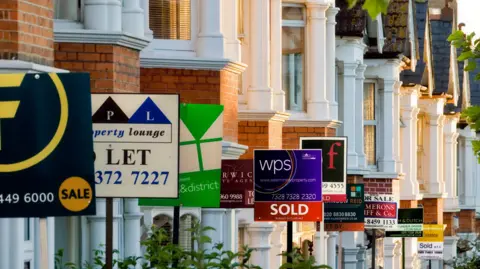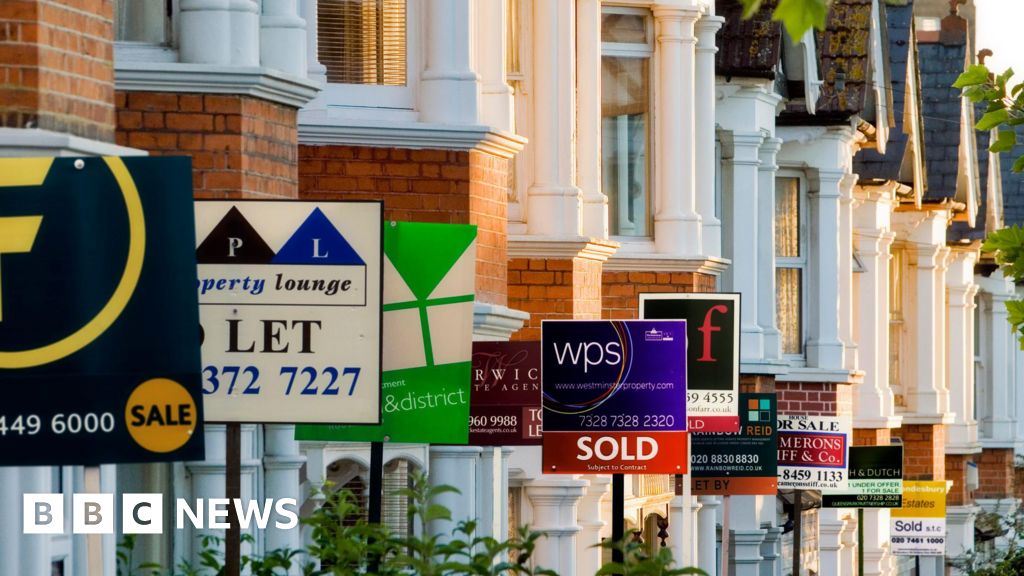8 minutes agoBy Kevin Peachey and Shanaz Musafer, BBC NewsGetty ImagesLabour and the Conservatives have accused each other of failing to match promise
By Kevin Peachey and Shanaz Musafer, BBC News
 Getty Images
Getty ImagesLabour and the Conservatives have accused each other of failing to match promises on housing, in what has become a key battleground in the election campaign.
The Conservatives said they were offering a better deal on stamp duty, by permanently abolishing the levy for first-time buyers purchasing properties up to £425,000.
Meanwhile, Labour said its more ambitious plans for energy efficiency in rental homes would protect tenants from higher energy bills.
Many people who have got in touch with the BBC via Your Voice, Your Vote said that housing was the most important issue for them during this election.
The threshold at which first-time buyers start paying stamp duty was temporarily raised from £300,000 to £425,000 until April next year.
The Conservatives have pledged to keep it at that level permanently and claim that by not matching their plan, first-time buyers under Labour would face a tax bill of up to £11,250.
Housing Secretary Michael Gove, who is not standing for re-election, said the Conservatives had a “clear plan” to help people get on to the housing ladder, and accused Labour of “hammering hundreds of thousands of first-time buyers with a massive stamp duty increase from next April”.
However, Labour leader Sir Keir Starmer told the BBC: “In the Budget the government set out clearly its plan, that was costed, in relation to stamp duty and we will hold to that because it’s fully costed.”
He said the Conservatives’ proposal on stamp duty was “another example” of an unfunded commitment, which he would not follow.
Analysts point out that stamp duty is primarily paid by those buying larger homes, or in more expensive areas. Potential savings would not benefit everyone, as some would not need to pay it anyway.
According to the Office for National Statistics, the average house price for first-time buyers in Britain in April 2024 was £236,000, which would not be subject to any stamp duty.
Meanwhile, Labour has pledged swift action to protect renters, and claimed that tenants would be “better off” under them than under the Conservatives.
It said it would immediately ban no-fault evictions, something which the Conservatives have also pledged to eventually do after the government ran out of time to pass the relevant legislation ahead of the election.
Labour also said it would require all landlords to bring rental homes up to Energy Performance Certificate rating C by 2030, which it claims will save the average tenant £250 a year.
That is a massive undertaking and questions remain over whether it is achievable, following concerns raised by charities over the quality of insulation fittings under government schemes.

What are the parties promising?
The Conservatives would build homes, prioritising brownfield development. They would permanently waive stamp duty tax for first-time buyers of properties costing up to £425,000. This threshold was raised temporarily and is due to revert to £300,000 in March 2025.
Labour would reform planning rules, fast-forward development on brownfield and what it calls “grey belt” land such as car parks. It wants to extend an existing scheme, which helps people get a mortgage with a smaller deposit and is backing more rights for renters.
The Liberal Democrats want additional social housing and new “garden cities”. They support local authorities that want to end the “right to buy” policy for council housing, ban no-fault evictions, make three-year tenancies the default, and create a national register of licensed landlords.
The Green Party would invest in new social housing and bring empty properties back into use. They would set higher environmental standards for new builds and would require more affordable units. They support rent controls and an eviction ban.
The Scottish National Party has declared a national housing emergency and is promising funding for new affordable homes across Scotland, including for rural and islands projects.
Plaid Cymru would expand social housing and support the Welsh construction industry. The party would allow local authorities to buy back more second homes and holiday lets. They want a ban on no-fault evictions and rent controls.
Reform would fast-track planning, offer tax incentives for development on brownfield sites and give tax breaks to small-scale landlords. People born in the UK would be given priority for social housing.
www.bbc.com

